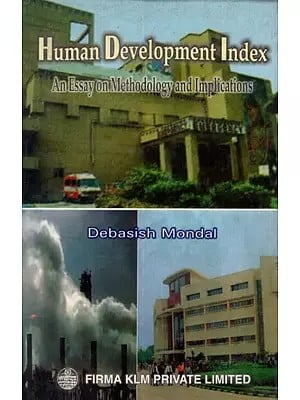Human Development Index- An Essay on Methodology and Implications By Debasish Mondal
Human Development Index- An Essay on Methodology and Implications By Debasish Mondal
Hardcover
Couldn't load pickup availability
Book Description
This book delves into the complexities of the Human Development Index (HDI), exploring its significance as both a measure and strategy in the realm of human development, particularly against the backdrop of globalization. The author, Debasish Mondal, critically examines the limitations of existing HDI constructions by UNDP and various countries, including India. He addresses fundamental questions: What are the shortcomings of the HDI? How can these be remedied? What variations exist between the UNDP's HDI and alternative methodologies? Through a focused analysis of West Bengal's districts, Mondal reconstructs the HDI using modified methodologies, revealing crucial insights and implications for development planning. This work is essential for scholars, policymakers, and anyone interested in the intersections of economics, human capabilities, and development strategies.
About the Author
Debasish Mondal is a Reader in the Department of Economics with Rural Development at Vidyasagar University. Hailing from Birsingha in Paschim Medinipur district, he holds a Bachelor's degree in Economics from Ramkrishna Mission Mahavidyalaya and a Master's degree from the University of Calcutta, where he excelled with a first-class standing. Mondal's academic journey includes an M. Phil. in Economics, achieved with the highest marks, and he has served as a lecturer at Kharagpur College before joining Vidyasagar University. His research interests encompass economic and econometric analysis, particularly methodologies. He is the author of "Rural Development: Theory and Experience" and has published numerous articles on topics including game theory, consumption behavior, decentralized planning, and poverty.
Preface
The Human Development Index (HDI) has gained significant attention as a crucial tool for measuring and strategizing human development in an increasingly globalized world. While the HDI constructed by the UNDP and its adaptations in various countries, including India, serve as valuable indicators, they are not without flaws. This work addresses critical questions about the HDI's limitations and proposes remedies for its inadequacies. By contrasting the UNDP's methodology with modified approaches, particularly in the context of West Bengal's districts, this study aims to shed light on the disparities in HDI interpretations and their implications for effective development planning.
I extend my gratitude to Professor P.N. Roy, former Pro-Vice Chancellor (Academic) at the University of Calcutta, for reviewing earlier drafts of this work. I am deeply indebted to Professors Asis Kumar Banerjee, Hiron Kumar Banerjee, Pradip Maity, and Dipankar Coondoo for their invaluable insights and support.
Introduction
At the heart of development lies the enhancement of human capabilities, freedoms, and achievements. As articulated by Anand and Sen (1994), the intrinsic importance of human lives supersedes mere material possessions. While income and commodities play instrumental roles in living standards, they do not encapsulate the essence of development itself. True development transcends mere increases in per capita income; it encompasses the broadening of capabilities and freedoms that allow individuals to lead fulfilling lives.
Human development, therefore, must be understood as a composite measure, one that attempts to quantify the average attainment of various human ends. Despite its appeal, the challenge remains in accurately measuring these achievements and capabilities. A society is deemed more developed than another based on its citizens' ability to enjoy decent living conditions, liberty, and freedom—core tenets of human life that this book seeks to explore in detail.
Share


